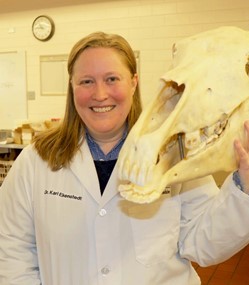2023-Applications of Genomics
The Genetics & Genome Sciences Program at Michigan State University Presents a Symposium On:
Applications of Genomics
Tuesday, May 9th, 2023
9:30 a.m. to 3:00 p.m.
Molecular Plant Sciences, Room 1200
1066 Bogue Street
Michigan State University
REGISTRATION LINK
Schedule
| Time | Event |
| 9:30 am |
Registration and Poster Set-Up (Coffee and Snacks) |
|
9:55 am |
Welcome and Opening Remarks |
|
10:00 am |
Dr. Ya Yang "Evolutionary analyses of genomes and transcriptomes in diverse non-model plants" |
|
11:00 am |
Dr. Kari Ekenstedt "Genomic Applications in Dog Genetic Diseases" |
|
12:00 pm |
Lunch |
|
1:00 pm |
Poster Session & Break |
|
2:00 pm |
Dr. Francisco J. Sánchez-Rivera "Functional studies of genetic variation using precision genome editing" |
Poster Presenters
| Name | Title |
| Huan Chen | Evolution of the ACTIN DEPOLYMERIZING FACTOR (ADF) gene family in Arabidopsis |
| Laura Ford | A large animal model of RDH5-associated retinopathy recapitulates important features of the human phenotype |
| Nick Johnson |
Chromosome-level assemblies reveal subtelomeric 5-enolpyruvylshikimate-3-phosphate synthase (EPSPS) copy number variation confers glyphosate resistance in Eleusine indica |
| Emily Roggenkamp | Interactions between Zea mays and the fungal pathogen Phyllachora maydis |
| Hao Yuan | An ML framework for precision medicine: from patient-specific gene networks to translational
animal models |
2023 Speakers

Kari Ekenstedt, DVM, Ph.D.
Assistant Professor
Department of Basic Medical Sciences
College of Veterinary Medicine
Purdue University
Title: "Genomic Applications in Dog Genetic Diseases"
Research: Kari Ekenstedt received her DVM and her PhD in Comparative and Molecular Biosciences from the University of Minnesota. She has been an Assistant Professor at Purdue University’s College of Veterinary Medicine since 2017. Her research program investigates the genetic basis for inherited musculoskeletal, neurological, and ophthalmic disorders in dogs. Kari’s teams have discovered the mutations causing multiple forms of polyneuropathy in Leonbergers and Golden Retrievers and one form of progressive retinal atrophy (PRA) in Papillons, with several more genetic conditions solved already in 2023. She also teaches large animal gross anatomy to first year vet students. Kari shares her West Lafayette, IN home with two minimally compliant cats who despise one another despite being litter siblings.

Francisco J. Sánchez-Rivera, Ph.D.
Assistant Professor
HHMI Hanna H. Gray Fellow
Department of Biology at MIT
Koch Institute for Integrative Cancer Research at MIT
Title: "Functional studies of genetic variation using precision genome editing"
Research:The overarching goal of the Sánchez-Rivera laboratory is to elucidate the cellular and molecular mechanisms by which genetic variation shapes normal physiology and disease, particularly in the context of cancer. To do so, we develop and apply genome engineering technologies, genetically-engineered mouse models (GEMMs), and single cell lineage tracing and omics approaches to obtain comprehensive biological pictures of disease evolution at single cell resolution. By doing so, we hope to produce actionable discoveries that could pave the way for better therapeutic strategies to treat cancer and other diseases.

Ya Yang, Ph.D.
Assistant Professor
Department of Plant and Microbial Biology
University of Minnesota-Twin Cities
Title: "Evolutionary analyses of genomes and transcriptomes in diverse non-model plants"
Research: The Yang Lab works on plant systematics and evolution. We combine field and collection-based approaches with phylogenetics, transcriptomics, and genomics to reconstruct species relationships, detect polyploidy and reticulate evolution, and to explore gene families and modules involved in secondary metabolites, stress tolerance, and chromosome evolution.